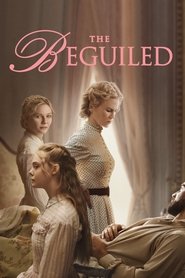A swing… and a miss? Despite the outrageously beautiful atmospheric shots of Spanish moss and overhanging branches, there's something more than a little clumsy about the film's control of tone and heavy-handed metaphor. Putting aside the rather on-the-nose shots of spiders webs and so forth, The Beguiled always felt like it was on the verge of something genuinely dark under its symbolic lace doilys within its temple-like pseudo-Acropolis architecture, yet it either veered away at the last moment or resorted to shock tactics of a kind (eg. the chandelier or the poor turtle). Of course, there is certainly more than a little subtext in play (!), but the concept of "a man in a woman's world" felt a little exhausted after the first act was through and it was not replenished by any broader context about, say, the political and symbolic role of virginal white women when set against "savage" Black sexuality. Indeed, a more aggressive (and transgressive) remake would have cast an African-American in the role of Corporal John McBurney and let the screenplay play out as before. Now we're cooking with paraffin.
If taken strictly as a mood piece, it’s beyond reproach […] The case can be made for The Beguiled […] fitting into a cinephilic legacy: The hushed timbre of Amy’s relationship to the immobilized McBurney harkens back to Victor Erice’s Spirit of the Beehive, while the remoteness of this particular moss-eaten, Greek-columned location evokes Picnic at Hanging Rock, Black Narcissus, and the films of Luchino Visconti. […] Less apiece with the socio-historical context of the Civil War than it is with the trendy and, lest we forget, long-overdue misandry of 2017. This isn’t to say that men aren’t trash; it’s that the film stakes so much on that revelation as to linger in the memory, once the credits have rolled, as something of a pantomime in themes.
— Steve Macfarlane (Slant Magazine)
Smugly manages to allow Coppola continued focus on the most prominent motif in her work, white femininity, while critiquing the film’s period setting through that motif, and that has to count for something.
— Andy Crump (Paste Magazine)

